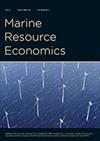发展中国家小规模渔业改革分配后果的生物经济局部一般均衡评估
IF 1.7
3区 经济学
Q2 ECONOMICS
引用次数: 1
摘要
渔业改革可以增加发展中国家小规模渔业退化所创造的财富。然而,关于改革的分配后果的实证研究却很少。以前的实证研究主要集中在孤立的渔业部门,或者没有将家庭划分为社会经济群体。我们使用生物经济-地方总体平衡模型评估渔业改革的分配后果,该模型是用菲律宾一个市政当局的数据估计和校准的。我们将家庭分为不同收入水平的捕鱼家庭和非捕鱼家庭。随着鱼类种群的恢复,捕鱼家庭克服了最初的损失,富裕的捕鱼家庭获得了更大的绝对收益。非捕鱼家庭遭受负面溢出效应和更高的鱼类价格,随着鱼类种群的恢复,他们的收益只有适度的增加,在评估的20年期间,他们的境况更糟。我们的研究结果表明,需要采取补充政策来弥补短期损失和家庭间的异质性结果。我们还研究了贸易如何调节改革的影响。本文章由计算机程序翻译,如有差异,请以英文原文为准。
A Bioeconomic Local General Equilibrium Assessment of Distributional Consequences of Small-Scale Fisheries Reform in Developing Countries
Fisheries reform can increase wealth created by degraded small-scale developing-world fisheries. However, empirical studies of distributional consequences of reforms are scarce. Previous empirical studies largely focus on the fishing sector in isolation or do not disaggregate households into socioeconomic groups. We assess the distributional consequences of a fishery reform using a bioeconomic local general equilibrium model estimated and calibrated with data from a Philippine municipality. We disaggregate households into fishing and nonfishing households with different income levels. Fishing households overcome initial losses as the fish stock recovers, with wealthier fishing households attaining larger absolute gains. Nonfishing households suffer negative spillovers and higher fish prices, and gain only moderately as the fish stock recovers, leaving them worse off over the 20-year period assessed. Our results suggest a need for complementary policies to redress short-run losses and heterogeneous outcomes across households. We also examine how trade mediates the impacts of the reform.
求助全文
通过发布文献求助,成功后即可免费获取论文全文。
去求助
来源期刊

Marine Resource Economics
农林科学-渔业
CiteScore
4.30
自引率
10.30%
发文量
25
审稿时长
>12 weeks
期刊介绍:
Marine Resource Economics (MRE) publishes creative and scholarly economic analyses of a range of issues related to natural resource use in the global marine environment. The scope of the journal includes conceptual and empirical investigations aimed at addressing real-world oceans and coastal policy problems. Examples include studies of fisheries, aquaculture, seafood marketing and trade, marine biodiversity, marine and coastal recreation, marine pollution, offshore oil and gas, seabed mining, renewable ocean energy sources, marine transportation, coastal land use and climate adaptation, and management of estuaries and watersheds.
 求助内容:
求助内容: 应助结果提醒方式:
应助结果提醒方式:


